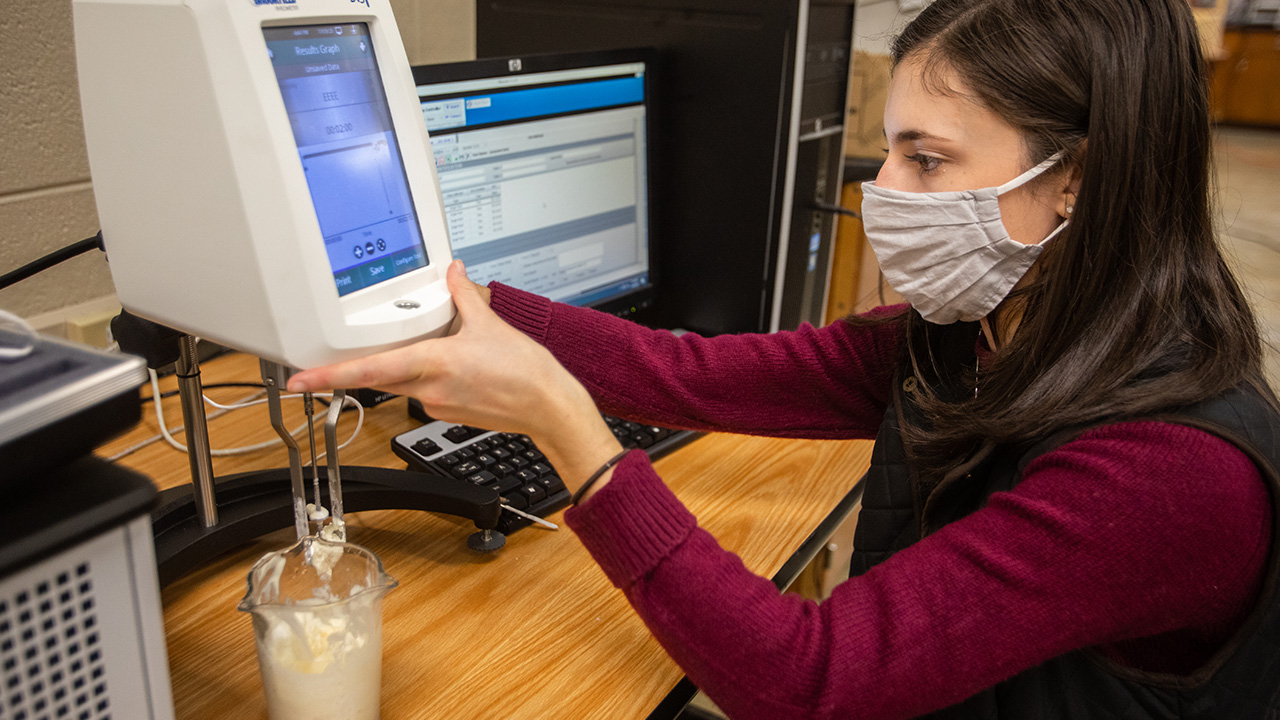
Wisconsin is known worldwide for its dairy products, and ice cream is an almost universal favorite. Yet what we love about it can often be hard to describe. Now, mechanical engineering professors Dr. Thomas Zolper and Dr. Bidhan Roy are looking at the science behind one of the world’s most popular treats as part of their research for the UW-Platteville Dairy Innovation Hub.
For the first steps of the project, Zolper and Roy and environmental engineering student Victoria Chanez will conduct sensory surveys to determine common features of customer satisfaction when it comes to ice cream. It is a challenging area of research that few have attempted, because perceptions not only vary from person to person, but often prove difficult to measure.
“We know something like creaminess is a key feature of customer satisfaction, but creaminess is kind of defined by individuals in their own way and there is no way to measure that scientifically,” Zolper said. “However, we can take other things that we can measure scientifically like the thickness of the ice cream, the smoothness of the ice cream, and the viscosity of the ice cream, and then do surveys of people tasting ice cream to figure out what is the optimum combination to maximize creaminess.”
As part of their grant with the Dairy Innovation Hub, the team was able to purchase an Anton-Parr MCR 302 rheometer, a device that can measure viscosity and many other properties of semi-solids like ice cream. One of the key elements it measures isviscoelasticity, an important variable in customer satisfaction.
“Some people like ice cream fresh out of the freezer and others prefer to let it sit out and get soft,” Zolper said. “The equipment allows us to measure the many rheological properties of ice cream at different temperatures and use those to make connections to what occurs in the mouth when people are eating it.”
Chanez, a junior from Kaukana, Wisconsin, will assist with measuring viscosity and other variables, as well as conducting sensory surveys with students in the WiSTEM and Explore EMS Living Learning Communities. Once the baseline data has been collected, she will work with Dr. Tera Montgomery and her animal science classes to create a unique recipe and produce their own ice cream. With each mix, they can adjust factors like sugar and fat content to get closer to the perfect pint. Chanez’s environmental background and chemistry minor also adds a new perspective to the project, allowing the group to consider factors like the sustainability of the ingredients used and the potential health impacts of ice cream. While the project may seem outside her typical scope of study, Chanez said it makes her research experience even more valuable.
“One of the reasons I chose UW-Platteville was the ability to get involved in undergraduate research so early. I think there is a misconception that you only need to do research if you’re planning on going to graduate school, but for me it was a great way to get experience in the real world,” Chanez said. “Here we are on the verge of new discovery, or at least an area that hasn’t been studied as much, so it’s neat to be able to make those connections. Plus, I get to work with people outside my discipline. Being able to work with mechanical engineering and animal science professors will give me some really unique experience.”
This interdisciplinary aspect is a central tenet of many of the research projects being funded through the UW-Platteville Dairy Innovation Hub. Professors and undergraduate researchers with backgrounds in engineering, agriculture, and the social sciences, as well as local farmers and experts from across the state are coming together to share their knowledge and advance the field. Not all the subjects are as beloved as ice cream, yet Zolper said everyone involved with the Dairy Innovation Hub has an important role to play – especially when it comes to how that research is shared. While the industry as a whole can learn from their findings, Zolper believes it is really the small farmers and producers that can have the greatest benefit.
“A lot of your cuisine or specialty cheeses are manufactured in “mom and pop” type shops. Using research like ours, they can develop a unique taste, they can develop a higher quality product, plus use locally-sourced ingredients for milk and other dairy products,” Zolper said. “In the news you hear a lot about small family farm closures and research like this is taking the right preventative steps to ensure that this Wisconsin-based industry remains viable and competitive.”